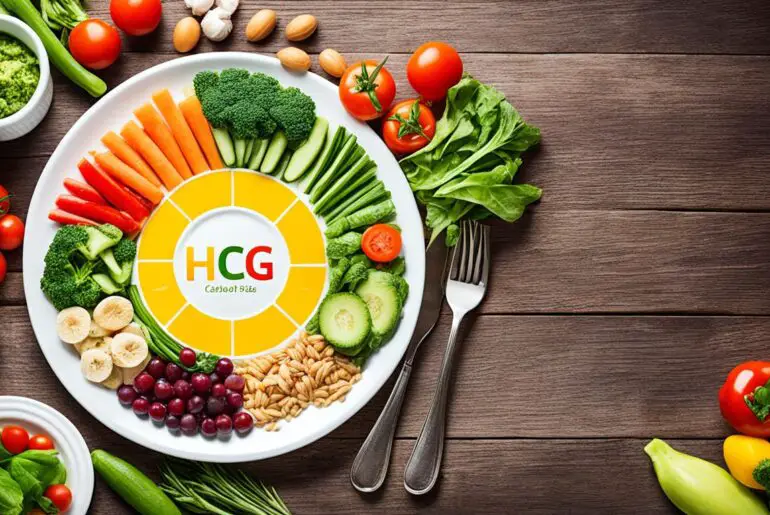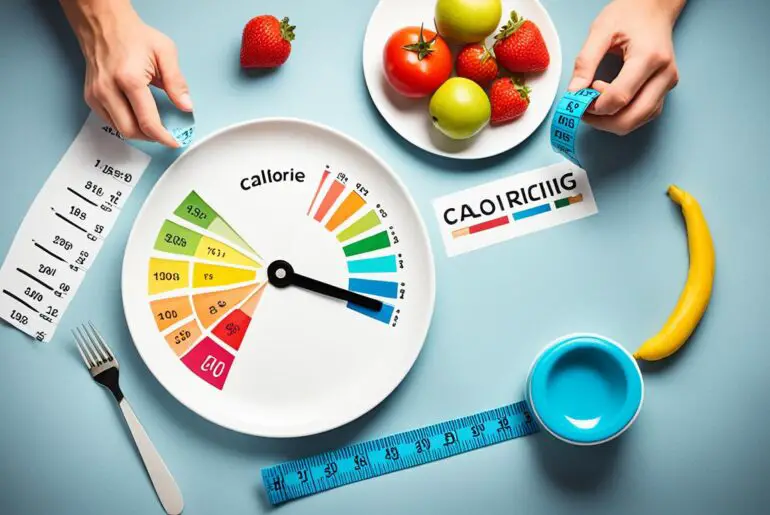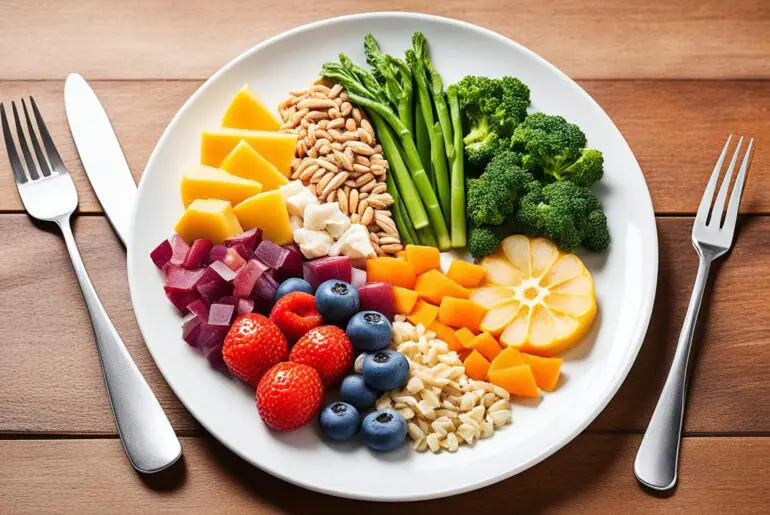When it comes to weight loss, we often hear about diets that promise quick results. One such diet is the HCG diet, which has gained popularity over the years. But here’s the burning question: How low is too low when it comes to calorie intake on the HCG diet?
The HCG diet involves consuming a very low-calorie diet of 500 to 800 calories per day while also receiving supplemental HCG injections. Many people swear by the diet and claim to have achieved significant weight loss. But is this extreme calorie restriction safe and sustainable? And what do experts have to say about it?
In this article, we will take a close look at the minimum calorie intake for the HCG diet and explore the scientific evidence, expert opinions, and potential risks associated with this controversial weight loss approach. Are you ready to uncover the truth behind the HCG diet and its calorie requirements? Let’s dive in!
Key Takeaways:
- The HCG diet involves consuming a very low-calorie diet of 500 to 800 calories per day, along with supplemental HCG injections.
- There is no scientific evidence supporting the claims made by the diet’s founder, and the FDA does not approve of HCG for weight loss.
- Registered dietitians caution against the HCG diet due to its severe calorie restriction and potential nutrient deficiencies.
- While the HCG diet may lead to rapid weight loss initially, it is not sustainable in the long term and can negatively affect metabolism and hormones.
- There are safer and more sustainable alternatives to the HCG diet, such as consulting with a healthcare professional and adopting a balanced, personalized approach to weight loss.
What is the HCG diet?
The HCG diet, also known as the low-calorie HCG diet, is a weight loss program that involves following a very low-calorie diet while supplementing with HCG hormone injections. This diet was developed by British endocrinologist Albert Simeons in the 1950s. Simeons believed that by combining a very low-calorie diet with HCG injections, individuals could burn stored body fat without experiencing hunger or weakness.
“The HCG diet is a revolutionary approach to weight loss that can help you achieve your desired body weight quickly and effectively.”
Although the HCG diet has gained popularity over the years, it is important to note that there is no scientific evidence to support the effectiveness of HCG in promoting weight loss. Furthermore, the U.S. Food and Drug Administration (FDA) does not approve the use of HCG for weight loss purposes.
Testimonials from individuals who have tried the HCG diet may report significant weight loss. However, it is essential to understand that the weight loss observed is primarily due to the severe calorie restriction imposed by the diet, rather than the purported effects of the HCG hormone itself.
To further evaluate the impact of the HCG diet, it is crucial to consider the lack of scientific support and the absence of FDA approval. The HCG diet may not be the safest or most reliable approach to weight loss.
| Key Points |
|---|
| The HCG diet involves a very low-calorie diet and HCG hormone injections. |
| Albert Simeons developed the HCG diet in the 1950s. |
| There is no scientific evidence supporting the effectiveness of HCG for weight loss. |
| The FDA does not approve the use of HCG for weight loss. |
| Testimonials on the HCG diet may be attributed to the severe calorie restriction rather than the HCG hormone. |
What foods are allowed on the HCG diet?
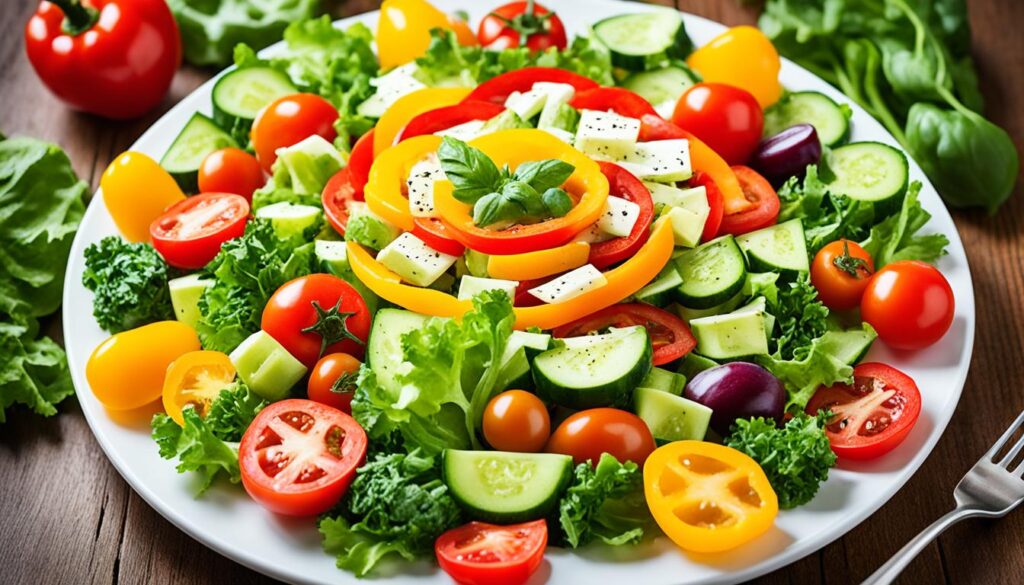
The HCG diet allows for specific foods to be consumed during the very low-calorie phase. Here is a breakdown of the foods that are allowed on the HCG diet:
Lean proteins on HCG diet:
- Lean ground beef
- Pork loin
- Turkey cutlets
- Skinless chicken breast
- Baked white fish
Nonstarchy vegetables on HCG diet:
- Cauliflower
- Spinach
- White mushrooms
- Zucchini
- Cucumber
- Celery
Limited fruits on HCG diet:
- Watermelon
- Honeydew
- Cantaloupe
- Berries
In addition to these foods, you can also include coffee, tea, stevia or saccharin for sweetening, and 1 tablespoon of milk in your HCG diet. It’s important to note that portion sizes and preparation methods should be followed strictly in order to stay within the allowed calorie limit and achieve the desired results.
Is the HCG diet safe?
The safety of the HCG diet is a major concern, as it is not approved by the FDA for weight loss. Despite its popularity, there is a lack of scientific evidence supporting the effectiveness of the diet. Registered dietitians caution against the severe calorie restriction that the HCG diet entails, as it can lead to nutrient deficiencies and have detrimental effects on overall health.
One of the main concerns with the HCG diet is the use of HCG injections. While HCG is naturally produced by the human body during pregnancy, there are potential risks and side effects associated with its use for weight loss. These include pain, bruising, infection at the injection sites, and allergic reactions.
More worryingly, serious adverse reactions have been reported in relation to the HCG diet. These include pulmonary embolism, depression, cardiac arrest, and even death. These severe complications emphasize the importance of not following the HCG diet without medical supervision.
Risk of Nutrient Deficiencies
The severe calorie restriction of the HCG diet increases the risk of nutrient deficiencies. This is because the diet limits food choices and restricts caloric intake to as low as 500 to 800 calories per day. Such a low-calorie intake can make it challenging to obtain adequate amounts of essential nutrients like vitamins, minerals, and proteins.
Furthermore, the HCG diet restricts the intake of certain food groups, such as carbohydrates and fats, which are important sources of energy and essential nutrients. This further increases the risk of nutrient deficiencies and can have negative consequences for overall health.
FDA’s View on the HCG Diet
The FDA does not approve of HCG for weight loss. The agency has issued warnings against the use of HCG products for weight loss, highlighting the lack of scientific evidence supporting their effectiveness and the potential risks associated with their use.
The FDA advises consumers to steer clear of HCG products marketed for weight loss, as they are unproven and potentially dangerous.
The FDA’s stance is based on the lack of scientific evidence and the potential risks and side effects associated with the HCG diet. It is always important to prioritize safety and follow evidence-based approaches when it comes to weight loss.
Does the HCG diet lead to sustainable weight loss?

While the HCG diet may initially result in rapid weight loss, it is not a sustainable long-term solution. The diet relies on a severe calorie restriction, which can ultimately slow down metabolism and lead to weight regain.
In the short-term, the HCG diet may lead to some weight loss due to the low-calorie intake. However, the impact of this restriction on metabolism and hormones is unfavorable, making sustained weight loss difficult to achieve.
Researchers suggest that exploring mechanisms other than calorie restriction may be more effective for long-term weight control. The HCG diet is not recommended by health care professionals for sustained weight loss due to its limitations and potential negative effects on the body.
It is important to note that sustained weight loss requires a comprehensive approach that considers individual needs, preferences, and lifestyle factors. Consulting with a health care professional can provide personalized guidance and support in developing a weight loss plan that is safe, effective, and sustainable in the long run.
Risks and side effects of the HCG diet
The HCG diet poses several risks and potential side effects that individuals should be aware of before considering this weight loss method. The severe calorie restriction associated with the diet can lead to various health complications and challenges. Some of the primary risks and side effects of the HCG diet include:
- Potential Nutrient Deficiencies: Due to the limited food choices and low-calorie intake, the HCG diet may result in nutrient deficiencies, particularly in vitamins, minerals, and essential nutrients necessary for optimal health.
- Fatigue: The significant calorie deficit can lead to fatigue, weakness, and decreased energy levels, making it difficult to perform daily activities or stick to regular exercise routines.
- Potential for Weight Regain: Once the HCG diet is discontinued, there is a high likelihood of weight regain. The body may attempt to compensate for the previous calorie restriction by storing additional fat, leading to rapid weight gain.
- Serious Adverse Reactions: In some rare cases, individuals following the HCG diet may experience serious adverse reactions, including pulmonary embolism, depression, cardiac arrest, and even death. These severe complications emphasize the importance of considering safer weight loss options.
It’s crucial to note that the FDA does not approve the use of HCG injections for weight loss. The potential risks and side effects associated with the HCG diet make it a risky choice for those seeking long-term weight management and overall health improvement.
| Potential Risks and Side Effects | Solutions |
|---|---|
| Potential nutrient deficiencies | Consult with a registered dietitian to ensure proper nutritional intake and consider appropriate dietary supplementation. |
| Fatigue | Focus on consuming a balanced, nutrient-dense diet to help combat fatigue. Engage in light exercises and prioritize rest and recovery during the weight loss process. |
| Potential for weight regain | Adopt sustainable lifestyle changes and gradually increase caloric intake to prevent rapid weight regain. Consult a healthcare professional for personalized guidance. |
| Serious adverse reactions | Avoid the HCG diet altogether and explore safer alternatives for weight loss. |
Considering the significant risks and potential side effects associated with the HCG diet, it is important to prioritize health and well-being when choosing a weight loss plan. Consulting with a healthcare professional can provide personalized advice on safer and more sustainable alternatives for achieving and maintaining a healthy weight.
Alternatives to the HCG diet
For those seeking safer and more sustainable methods of weight loss, there are alternatives to the HCG diet. It is highly recommended to consult with a health care professional who can provide personalized guidance based on individual needs and goals. Adopting healthy and sustainable weight loss methods can lead to long-term success and improved overall well-being.
Eating a balanced diet is crucial for healthy weight loss. Focus on consuming whole foods that are rich in nutrients and low in calories. Incorporate a variety of lean proteins, such as chicken, fish, beans, and tofu, into your meals. Include plenty of fruits and vegetables that provide essential vitamins, minerals, and fiber. Limit processed foods, sugary beverages, and unhealthy snacks that contribute to weight gain.
Regular exercise is a key component of any effective weight loss plan. Engage in activities that you enjoy and that challenge your body. Aim for a combination of cardiovascular exercises, such as running, cycling, or swimming, and strength training exercises, such as weightlifting or bodyweight exercises. Exercise not only helps burn calories but also boosts metabolism and improves overall fitness.
Long-term success in weight loss relies on making lifestyle changes that can be maintained. Find healthy habits that work for you, such as meal prepping, mindful eating, and practicing portion control. Implement stress management techniques, such as meditation or yoga, to prevent emotional eating. Getting adequate sleep is also important, as poor sleep can disrupt metabolism and lead to weight gain.
“Consulting with a health care professional is crucial when it comes to weight loss. They can provide personalized guidance and support in developing a plan that suits your needs and goals.”
The scientific consensus on the HCG diet
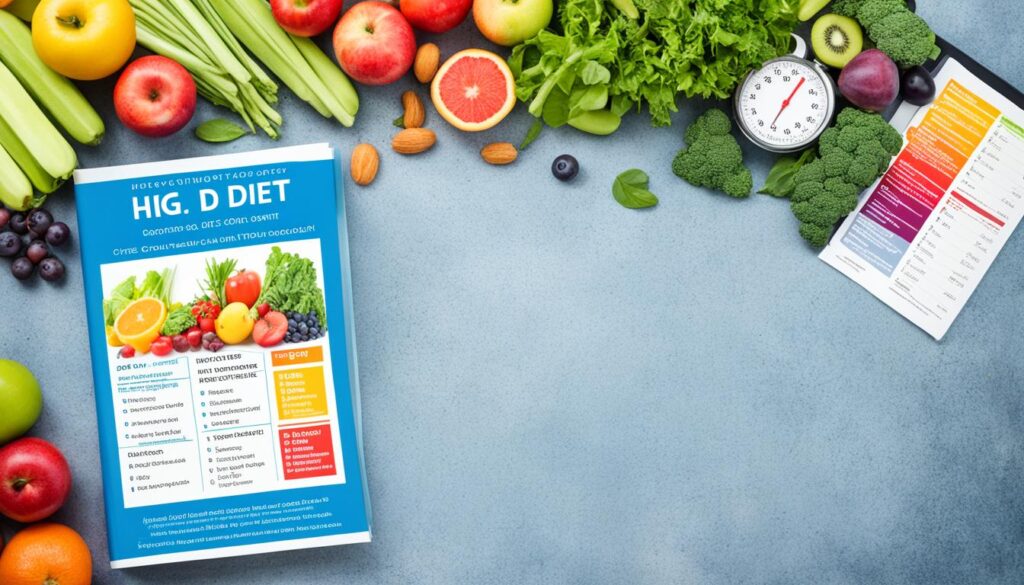
The scientific consensus on the HCG diet is clear – there is a lack of scientific support for its effectiveness or safety. Numerous studies have shown that any weight loss experienced on the HCG diet is solely due to severe calorie restriction, rather than the HCG hormone itself. Registered dietitians unanimously agree that the HCG diet is a dangerous and ineffective approach to weight loss, and it should not be recommended as a viable method.
“The HCG diet lacks scientific evidence and poses serious risks to individuals. The severe calorie restriction can lead to nutrient deficiencies, fatigue, and potential weight regain. It is an ineffective approach to weight loss.” – Registered Dietitian, Elizabeth Smith
Scientific research consistently supports the notion that the HCG diet is not only ineffective but also potentially harmful. The lack of reputable scientific studies demonstrating its efficacy and safety is a significant red flag. It is essential to prioritize evidence-based approaches to weight loss instead of relying on unproven methods like the HCG diet.
Potential Risks and Side Effects:
The HCG diet poses several risks and potential side effects:
- Severe calorie restriction can lead to nutrient deficiencies
- Increased fatigue and weakness
- Potential for weight regain once the diet is discontinued
- Adverse reactions such as pulmonary embolism, depression, cardiac arrest, and even death
Given its lack of scientific support and potential risks, it is crucial to avoid the HCG diet and opt for safer and more effective weight loss methods endorsed by healthcare professionals.
| Risks and Side Effects | Scientific Support | Efficacy |
|---|---|---|
| Nutrient deficiencies | No scientific support | Ineffective |
| Fatigue and weakness | No scientific support | Ineffective |
| Potential weight regain | No scientific support | Ineffective |
| Adverse reactions and risks | No scientific support | Ineffective |
Conclusion

In conclusion, the HCG diet is a very low-calorie diet that claims to promote weight loss through supplemental HCG injections. However, there is no scientific evidence to support its effectiveness, and it is not approved by the FDA for weight loss. The severe calorie restriction and potential nutrient deficiencies pose risks to health. Registered dietitians strongly advise against following the HCG diet and recommend safer and more sustainable weight loss methods.
Instead of resorting to the HCG diet, it is crucial to consult with a healthcare professional who can provide personalized guidance in achieving and maintaining a healthy weight. They can help develop a balanced and sustainable weight loss plan that includes a nutritious diet, regular exercise, and lifestyle changes that can be maintained in the long term.
For those seeking weight loss, it is important to prioritize long-term health and well-being. Relying on quick-fix diets like the HCG diet can lead to short-term results but often result in weight regain and potential adverse effects on health. By adopting healthier habits and working closely with a healthcare professional, individuals can achieve sustainable weight loss and improve their overall health.
Summary of HCG diet:
- The HCG diet involves following a very low-calorie diet (500 to 800 calories per day) along with supplemental HCG injections.
- There is no scientific evidence supporting the claims made by the diet’s founder, and the FDA does not approve of HCG for weight loss.
- The severe calorie restriction and potential nutrient deficiencies pose risks to health, and registered dietitians strongly advise against following the HCG diet.
- Consulting with a healthcare professional is recommended for personalized guidance in achieving and maintaining a healthy weight through safer and more sustainable weight loss methods.
- Do not follow the HCG diet as it lacks scientific evidence, is not approved by the FDA, and poses risks to health.
- Consult with a healthcare professional who can provide personalized guidance for achieving weight loss in a safe and sustainable manner.
- Focus on adopting a balanced diet, engaging in regular physical activity, and making lifestyle changes that can be maintained in the long term.
- Prioritize long-term health and well-being over short-term weight loss goals.
Additional considerations for weight loss

When it comes to weight loss, the importance of a personalized approach cannot be overstated. Consulting with a health care professional is a crucial step in developing a weight loss plan that is tailored to your individual needs and goals. Their expertise can provide valuable guidance and support throughout your journey.
While quick-fix diets may promise rapid results, they often fail to deliver sustainable success. Instead, focus on developing healthy habits that can be maintained in the long term. A balanced diet, regular physical activity, stress management, and adequate sleep are all key components of a healthy lifestyle.
Why a personalized approach?
Weight loss is a unique and personal journey, as everyone’s body and metabolism function differently. What works for one person may not work for another. By consulting with a health care professional, you can uncover personalized insights about your specific needs and create a plan that addresses your individual challenges and goals.
Developing healthy habits
Rather than relying on drastic and restrictive diets like the HCG diet, it is important to focus on developing healthy habits. Sustainable weight loss involves making lifestyle changes that promote overall well-being. Here are some key habits to consider:
- Eating a balanced diet: Focus on consuming nutrient-dense foods that provide essential vitamins, minerals, and macronutrients. Include a variety of fruits, vegetables, lean proteins, whole grains, and healthy fats in your meals.
- Engaging in regular physical activity: Find activities you enjoy and make them a part of your routine. Aim for at least 150 minutes of moderate-intensity aerobic exercise per week, along with strength training exercises.
- Managing stress: Stress can contribute to overeating and hinder weight loss progress. Incorporate stress management techniques such as meditation, yoga, or deep breathing exercises into your daily routine.
- Getting adequate sleep: Lack of sleep can disrupt hormonal balance and increase cravings for unhealthy foods. Aim for 7-9 hours of quality sleep each night to support overall health and weight management.
By making these healthy habits a priority, you can not only achieve your weight loss goals but also improve your overall health and well-being. Remember, long-term success comes from sustainable lifestyle changes, not quick fixes.
Should you try the HCG diet?
Before considering the HCG diet for weight loss, it is important to be aware of certain considerations. First and foremost, there is a lack of scientific evidence supporting the effectiveness of this diet. The claims made by the diet’s founder have not been scientifically proven. Additionally, the FDA does not approve of HCG for weight loss, further raising concerns about its safety and efficacy.
One of the key risks associated with the HCG diet is the severe calorie restriction it imposes. Consuming only 500 to 800 calories per day can lead to nutrient deficiencies and potentially harm your overall health. It is important to ensure that any weight loss method you adopt is sustainable and provides your body with the necessary nutrients it needs.
Considering the risks and lack of scientific evidence, there are safer alternatives to the HCG diet that can help you achieve your weight loss goals. Consulting with a health care professional is highly recommended to receive personalized guidance on a balanced and sustainable approach to weight loss. By prioritizing your long-term health and well-being, you can make informed decisions about the most suitable weight loss strategies for you.
In conclusion, the HCG diet should be approached with caution due to the lack of scientific evidence, potential risks, and severe calorie restriction. It is advisable to explore safer alternatives and seek professional guidance when embarking on a weight loss journey. Your health and well-being should always be the top priority in making decisions about weight loss methods.
FAQ
What is the minimum calorie intake for the HCG diet?
The HCG diet typically involves consuming a very low-calorie diet of 500 to 800 calories per day.
What are the recommended calorie requirements for the HCG diet?
The optimal caloric intake during the HCG diet is typically between 500 and 800 calories per day.
Are there specific guidelines for caloric intake during the HCG diet?
Yes, the HCG diet follows strict calorie restrictions to ensure maximum weight loss. It is important to maintain the recommended calorie intake of 500 to 800 calories per day.
What is the recommended calorie limit for the HCG diet?
The HCG diet typically limits calorie intake to 500 to 800 calories per day.
How do I maintain the minimum calorie intake on the HCG diet?
To maintain the minimum calorie intake on the HCG diet, it is important to follow the recommended meal plan and portion sizes provided.
What is the HCG diet and how does it work?
The HCG diet is a weight loss program that involves following a very low-calorie diet (500 to 800 calories per day) along with supplemental HCG injections. It was developed by Albert Simeons in the 1950s, who claimed that HCG injections could help burn stored body fat without causing hunger or weakness. However, there is no scientific evidence to support these claims, and the FDA does not approve of HCG for weight loss.
What foods are allowed on the HCG diet?
The HCG diet allows for specific foods to be consumed during the very low-calorie phase. Lean proteins such as lean ground beef, pork loin, turkey cutlets, skinless chicken breast, and baked white fish are allowed. Nonstarchy vegetables like cauliflower, spinach, white mushrooms, zucchini, cucumber, and celery are also permitted. Limited fruits include watermelon, honeydew, cantaloupe, and berries. Other foods like coffee, tea, stevia or saccharin for sweetening, and 1 tablespoon of milk are also allowed.
Is the HCG diet safe?
The safety of the HCG diet is a concern as it is not approved by the FDA for weight loss. There is a lack of scientific evidence supporting the effectiveness of the diet, and registered dietitians caution against the severe calorie restriction and potential nutrient deficiencies it may cause. HCG injections can also have potential risks and side effects, including pain, bruising, infection at injection sites, and allergic reactions. Serious adverse reactions have been reported, including pulmonary embolism, depression, cardiac arrest, and death. The HCG diet should not be recommended or followed without medical supervision.
Does the HCG diet lead to sustainable weight loss?
While the HCG diet may initially lead to rapid weight loss, it is not sustainable in the long term. The severe calorie restriction can slow down metabolism and lead to weight regain. Lower calorie intakes may result in short-term weight loss, but the impact on metabolism and hormones is unfavorable. Researchers suggest exploring mechanisms other than calorie restriction for long-term weight control. The HCG diet is not recommended by health care professionals for sustained weight loss.
What are the risks and side effects of the HCG diet?
The HCG diet poses several risks and potential side effects. The severe calorie restriction can lead to nutrient deficiencies, fatigue, and potential weight regain once the diet is discontinued. Serious adverse reactions have been reported, including pulmonary embolism, depression, cardiac arrest, and death. Other side effects may include irritability, restlessness, depression, fluid buildup, and swelling of the breasts in men. The FDA advises against the use of HCG for weight loss due to these risks and side effects.
What are the alternatives to the HCG diet?
For those looking to lose weight in a safe and sustainable manner, there are alternative methods to the HCG diet. It is recommended to consult with a health care professional who can provide guidance tailored to individual needs. Healthy and sustainable weight loss methods include eating a balanced diet, engaging in regular exercise, and making lifestyle changes that can be maintained in the long term. These approaches have been proven to be effective for weight loss and can improve overall health and well-being.
What is the scientific consensus on the HCG diet?
The scientific consensus on the HCG diet is clear – there is no scientific support for its effectiveness or safety. Multiple studies have shown that weight loss on the HCG diet is solely due to severe calorie restriction and not the HCG hormone. Registered dietitians unanimously agree that the HCG diet is dangerous and should not be recommended. It is considered an ineffective approach to weight loss, with potential risks and side effects.
Should I try the HCG diet?
Considering the lack of scientific evidence, potential risks, and side effects associated with the HCG diet, it is not recommended to try this approach to weight loss. The severe calorie restriction and potential nutrient deficiencies can negatively impact health and sustainability of weight loss. Safer alternatives, such as consulting with a health care professional and adopting a balanced and sustainable approach to weight loss, should be considered. Prioritizing long-term health and well-being is key when making decisions about weight loss strategies.
What are some additional considerations for weight loss?
When it comes to weight loss, it is essential to take a personalized approach. Consulting with a health care professional can provide valuable guidance and support in developing a weight loss plan tailored to individual needs. Rather than relying on quick-fix diets like the HCG diet, focusing on developing healthy habits is crucial for long-term success. This includes adopting a balanced diet, engaging in regular physical activity, managing stress, and getting adequate sleep. These lifestyle changes can lead to sustainable weight loss and improved overall health.


